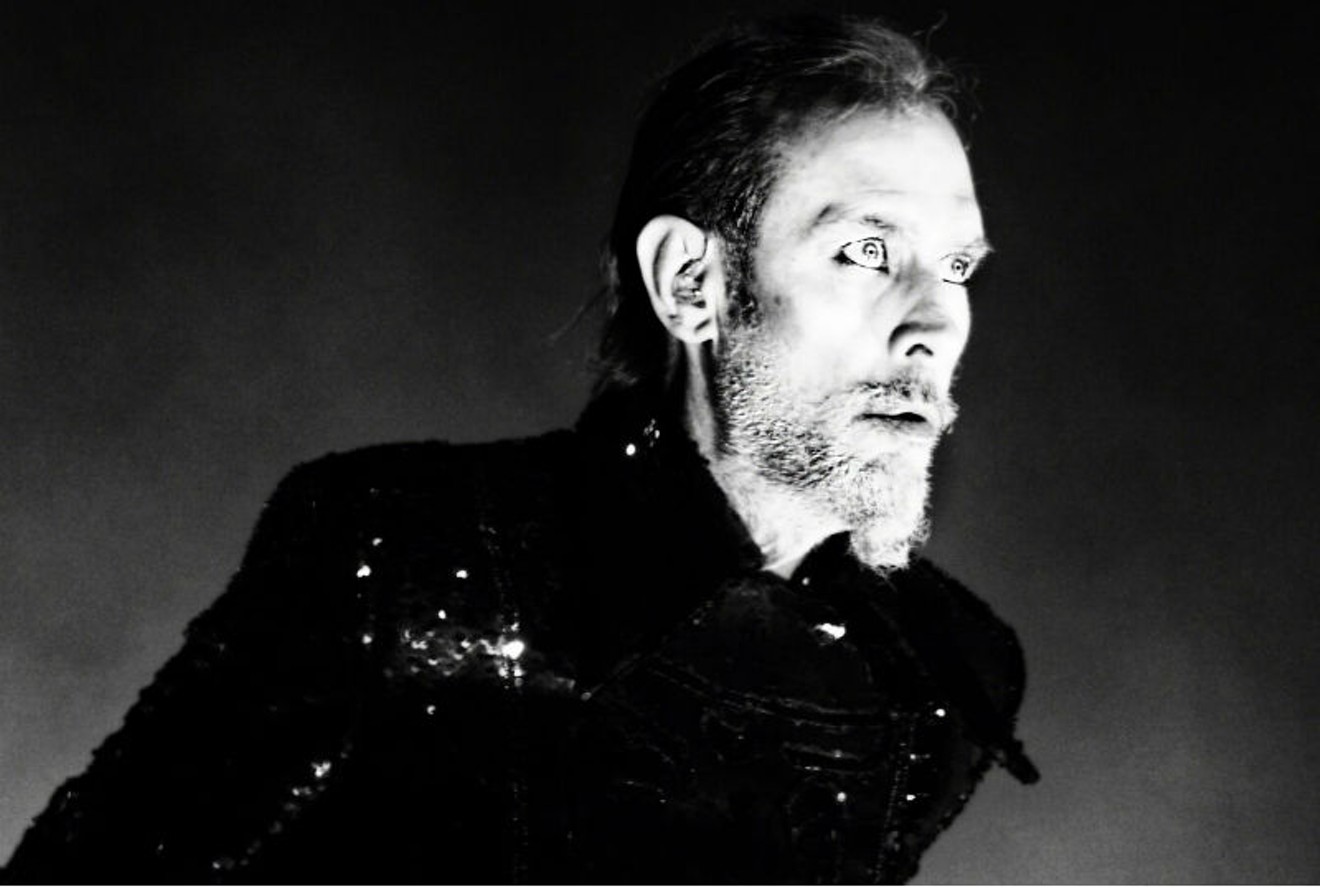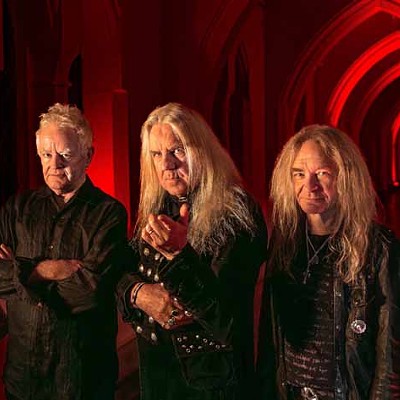Support Us
Houston's independent source of
local news and culture
account
- Welcome,
Insider - Login
- My Account
- My Newsletters
- Contribute
- Contact Us
- Sign out
Peter Murphy of Bauhaus and Bass Player David J Coming to White Oak Music Hall
David Ensminger January 29, 2019 5:30AM

Peter Murphy of Bauhaus
Photo by Gabriel Edvy
[
{
"name": "Related Stories / Support Us Combo",
"component": "11591218",
"insertPoint": "4",
"requiredCountToDisplay": "4"
},{
"name": "Air - Billboard - Inline Content",
"component": "11591214",
"insertPoint": "2/3",
"requiredCountToDisplay": "7"
},{
"name": "R1 - Beta - Mobile Only",
"component": "12287027",
"insertPoint": "8",
"requiredCountToDisplay": "8"
},{
"name": "Air - MediumRectangle - Inline Content - Mobile Display Size 2",
"component": "11591215",
"insertPoint": "12",
"requiredCountToDisplay": "12"
},{
"name": "Air - MediumRectangle - Inline Content - Mobile Display Size 2",
"component": "11591215",
"insertPoint": "4th",
"startingPoint": "16",
"requiredCountToDisplay": "12"
}
,{
"name": "RevContent - In Article",
"component": "12527128",
"insertPoint": "3/5",
"requiredCountToDisplay": "5"
}
]
In the poetic imagination, seminal writers seem to grapple with a million profundities but tend to return to the sacred ground that gave rise to their unique sound and vision. As an example of that trait, godfather of goth Peter Murphy of Bauhaus, a band named after the German architectural movement known for its severe and blunt forms, is re-exploring the four decades old genre.
Goth took root in the late 1970s in cities like the band’s own industry-strewn Northampton, UK during a post-punk fervor. Now, Murphy is touring America’s quickly-morphing, post-industrial landscape, now being reshaped by the gig economy, with his original bass player David J. This momentous gig will focus on their groundbreaking, darkly luminous, fragmented, and fractured 1980 debut album In the Flat Field, but they will be revisiting fan favorites too.
They’ll be performing at White Oak Music Hall on February 2.
Goth inspired a thousand subculture studies, including inspiring academics like Paul Hodkinson to catalog their telltale traits: consistency, identity, autonomy, and distinctiveness. Bauhaus has little in common with the contemporary black parasols, make-up embellishments, re-imagined Victorian chic, and pasty skin that have become commonplace signifiers. Yet, such fashion mutations and otherworldy attire do matter: goth is a society-within-society, often caricatured, but resilient nonetheless. As such, Goths mock the Xanadus of modern culture and offset them with a psychological ice storm. They crack and fissure the world presented via telegenic, clean, orderly, impregnable lives that zoom from the flux of Instagram feeds.
Bauhaus provided an avant-garde soundtrack by offering a sonic map of a culture that seemed to fold the grime and grind of late-capitalism, with its mess-heaps of massive steal, coal stacks, roller bearing factories, ominous buildings, and chemical-streaked skies, back into an era 100 years earlier, including London and Manchester experienced by dark-hearted romantic writers. In fact, the land that was Britain in the gloomy, stagnant 1970s felt like a conflict zone too, and the music produced by bands like the Fall, Bauhaus, Joy Division, and other of their ilk, while taking cues from first wavers like the Sex Pistols, seemed like an atrocity to the average normcore masses, who felt the music was rank with negation, noise, and nihilism that literally eroded the status quo.
Actually, they were … correct. As Bauhaus even sang on “Nerves,” the “sense of serenity [was] shattered.” Song titles like “Rosegarden Funeral of Sores” made bleakness feel bracing, and the song delivered that sensation too. Nothing would be the same.
Some goth-punk bands, like loud and lively 45 Grave, born on the West Coast of America, were rife with skin-crawling, B-movie gags and horror matinee tropes, but Bauhaus remained markedly different — alluring, mystifying, artful, and inherently dangerous. They understood that punk unlocked an endless tool kit of invention. “In the Flat Field,” the album’s namesake tune, is percussion-driven, dramatic, and forceful, while “Nerves” is spare, tinkling with piano, guitar drones and shards, plus piercing vocals that seem brittle one second, then suddenly fluid, as Murphy moans about the fabric of dreams being torn apart. “Small Talk Stinks” offers disdain for “sweet nothings … chit-chat … idle gossip” while dripping with droning muzak and an aural wallpaper featuring random audio clips remixed into textured, grating, noisy tangles.
In the Flat Field offers so much prescience for the new music manners. The tune “Double Dare” has drums that flail with the blunt monotony of a power tool, heavy buzzing bass, harrowing guitar, and a voice custom-built for a theater of charged agony. “Dive” is a post-modern, skittering, manic dance track addled with Atari blips and funky, damaged bass, guitar slivers, and Murphy’s trademark vocal night terrors. And with much bravura, Bauhaus’ disfigured cover of Mark Bolan’s “Telegram Sam” is genius — they effortlessly turn the laid back, groove-oriented glam vibe into a menacing, three-minute paroxysm with stop’n’start rhythms, breathless pounding, and vocals that howl, mewl, scream, and quaver. Murphy contains such breathless multitudes.
Plus, of all the punk and post-punk legions, Bauhaus, as if inheriting the musical equivalent of a Rosetta stone, deliver a convincing, arresting vision/version of Bowie’s “Ziggy Stardust” – the seminal glam-rock opus — that they eagerly imbibe with their own force. It reached number 15 on the British charts in 1982. So, if anything, that tune alone, plus their own legend-infused “Bela Lugosi’s Dead,” if played, should be worth the ticket cost. 40 years will collapse as their tunes unfurl, revealing that time itself is nothing more than a manufactured mirage. And Peter Murphy will provide the haunting soundtrack to the dissolution.
Peter Murphy: 40 Years of Bauhaus with David J is scheduled for February 2 at 8 p.m. with an opener from Desert Mountain Tribe at White Oak Music Hall, 2915 North Main. For information, visit whiteoakmusichall.com. All ages. $35-$200 plus fees.
KEEP THE HOUSTON PRESS FREE...
Since we started the Houston Press, it has been defined as the free, independent voice of Houston, and we'd like to keep it that way. With local media under siege, it's more important than ever for us to rally support behind funding our local journalism. You can help by participating in our "I Support" program, allowing us to keep offering readers access to our incisive coverage of local news, food and culture with no paywalls.
David Ensminger
Trending Music
- New Film Focuses on Rolling Stones' Muse Anita Pallenberg
- Blackberry Smoke Ignites Some Sizzling Southern Rock
- Joe Satriani and Steve Vai Shred 713 Music Hall
-
Sponsored Content From: [%sponsoredBy%]
[%title%]

Don't Miss Out
SIGN UP for the latest
Music
news, free stuff and more!
Become a member to support the independent voice of Houston
and help keep the future of the Houston Press FREE
Use of this website constitutes acceptance of our
terms of use,
our cookies policy, and our
privacy policy
The Houston Press may earn a portion of sales from products & services purchased through links on our site from our
affiliate partners.
©2024
Houston Press, LP. All rights reserved.




